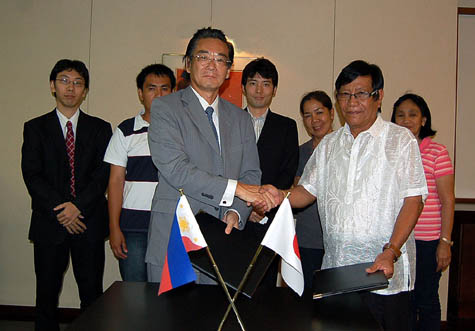Japanese Ambassador Makoto Katsura congratulates Mayor Fernando Quiton, Sr. of the Municipality of Sugpon, Ilocos Sur after signing the grant contract for “The Project for the Construction of Municipal Health Center for the Municipality of Sugpon, Ilocos Sur,” on January 24, 2011 at the Embassy of Japan. The ceremony was witnessed by the officials of the Municipality of Sugpon and the Embassy of Japan.
|
Japanese Ambassador Makoto Katsura and Mayor Fernando Quiton, Sr. of the Municipality of Sugpon, Ilocos Sur signed the grant contract for “The Project for the Construction of Municipal Health Center in the Municipality of Sugpon, Ilocos Sur” on January 24, 2011 at the Embassy of Japan. The project, amounting to US$ 116,127 (approximately 5.3 million pesos), is funded through the Grant Assistance for Grassroots Human Security Projects (GGP).
Sugpon is a sixth class tribal municipality in the Province of Ilocos Sur. It is home to about 4,000 individuals belonging to Bago-Kankanaey tribe. They earn their livelihoods by agriculture and fishery, but most of them live below the poverty line. With their limited income, the residents have a hard time addressing their basic social needs which include health services. The frequent swelling of Amburayan River makes it more difficult for the residents to have access to the nearest government health facility which is about 35 km far from Sugpon.
The Municipal Government has an existing health center, but it has already been dilapidated and lacks basic facilities and equipment necessary to provide sufficient health care services. Because of the lack of facilities and equipment, many pregnant mothers give birth at their houses, putting their health at risk.
Under these circumstances, the Municipal Government of Sugpon sought the assistance from the Embassy of Japan to improve the health and medical services for the residents. In this project, a new municipal health center with a five-bed capacity will be constructed and basic medical equipment will be also purchased. It is expected that the residents will enjoy an improved health services by the newly-constructed health center and the welfare of the local people will be enhanced.
Japan, as the top donor of the official development assistance for the Philippines, launched G GP in the Philippines in 1989 for the purpose of reducing poverty and helping various communities engaged in grassroots activities. As of March 2010, 434 grassroots projects funded by GGP – ranging from roughly 1 to 4 million pesos – have been implemented by NGOs, local government units and other non-profit organizations. The total grant for these projects so far amounts to US$ 18,982,775. Japan believes that this project will not only strengthen friendship between the peoples of Japan and the Philippines but also contribute to fostering a strategic partnership between Japan and the Philippines towards the future.
Japanese Version


